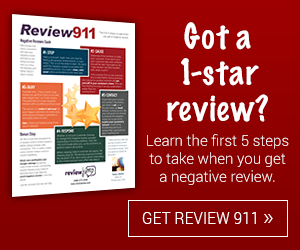
Online reputation management isn’t just about online reviews.
Online reviews are important for attracting new customers, search engine results, and the way people view any given company. But there’s more to ORM than just earning positive reviews and monitoring any reviews that come your way.
Brand mentions are also very important for your online reputation. Many business owners think tracking brand mentions is a waste of time– if they think about brand mentions at all.
When you’re running a business, you may not think you have the time or the bandwidth to even think about brand mentions. If you’re a busy marketer, you may feel you have more pressing matters to attend to. And, if you’re working on the agency side, you may not know if your clients want to pay for brand mention tracking.
After all, how important could someone talking about your brand on their personal blog, or on a platform like Twitter be?
Pretty dang important.
Keeping up on your brand mentions may not be a matter of life or death for most businesses but, if you’re not tracking them, you could be losing out on some valuable information and opportunities.
Insight, Feedback, and Opportunities
If you harness the power of brand mentions, you can take advantage of some serious marketing opportunities. We’ll get to that soon.
But first, let’s talk about the raw, immediate benefits of brand mentions– the information they contain.
What are people talking about when they mention your brand on Twitter, Facebook, or Tumblr? Are people on Reddit having robust discussions about your company?
If they are, you have a wealth of free information to sift through.
On a basic level, though, monitoring your brand mentions allows you to monitor public opinion. Even if you’re only getting one or two brand mentions per month, you can use those mentions to find out what real people think of your company.
Here’s what John Lincoln at Marketing Land has to say about brand mentions:
“If people are singing your praises, then you’ve stumbled across a world of opportunities, testimonials, guest blogs, networking and more. On the other hand, if people are criticizing your company, you have an opportunity to determine if the criticism is warranted, and if so, take the appropriate action.
I really try to look at criticism as an opportunity to improve; I consider it free consulting.”
An online review can tell you if your customers consistently think wait times are too long or your prices are too high. But people talk on social media much more often than they leave reviews.
Not everyone is comfortable with leaving an honest review on a public review platform. I know that to be the case– companies are always looking for more positive online reviews. That’s why I started RevenueJump in the first place.
But brand mentions come from many other sources, too. Simply digging through what people are saying about you online is, as John Lincoln put it, free consulting.
Brand mentions can tell you what you’re doing wrong and what you’re doing right.
For instance, if you ran a restaurant and noticed multiple people posting photos of a certain dessert item on Instagram, gushing about how it’s “the cutest thing they’ve ever eaten,” you’d know to promote that item more heavily. If, by the same token, you noticed more than a few people saying a menu item was “far too greasy,” or that your decor “needed some work,” you’d know what to evaluate and where to take action.
Here’s a real world example from content marketer Andrew Dennis:
“For example, my company recently unearthed a Twitter discussion regarding a bad user experience with our brand. An error in our systems had led to a few people being unable to unsubscribe from our mailing list. These individuals were rightfully upset, and they were discussing the matter via Twitter.
We became aware of the issue by finding the Twitter conversation. We responded to the complaints by letting the people affected know that we were working to resolve the problem, and we were able to both repair reputation damage and quickly fix the issue with our systems (which we were previously unaware of). Through this interaction, we were able to turn a negative situation into several positive outcomes.”
It’s like your customers are completing a feedback survey that you don’t even need to solicit.
These small brand mentions also give you an opportunity to respond to, and reach out to, your customers. If they think you’re listening, and if you make them feel special, they’ll become repeat customers. They may even become brand advocates.
Marketing and Backlinks

Now, let’s get to those marketing opportunities.
I’ll keep this brief, but I believe at least five different marketing opportunities exist within brand mentions:
- SEO/Link Building – If you’ve ever worked in or around online marketing, you know how valuable links can be for your search engine visibility. Brand mentions are just links waiting to happen. In many cases, it just takes an email or a phone call. Here’s an excellent guide to building links through brand mentions.
- Guest Blogging/Publishing – If a blogger or website has mentioned your company before, especially in a positive light, you have a better opportunity to publish something on that website. Follow up on what they wrote, or pitch something entirely new. You already have a foot in the door. At the very least, this will put some new eyes on your website.
- Networking – If someone’s talking about your brand, chances are they want to talk to you, as well. This can result in partnerships, new customers, and more. If someone is interested in your company, they’re someone you want to start a conversation with.
- Testimonials – If you’re seeing positive tweets and Facebook posts about your brand, you have an opportunity to use those posts as testimonials. Always ask permission, but oftentimes, brand mentions make for easier testimonials than tracking down a customer and asking them for feedback.
- Reputation Building – Tracking brand mentions allows you to directly interact with both satisfied and unsatisfied customers. As Andrew Dennis put it before, you should always seize the opportunity to turn a negative into a positive. Publicly responding to brand mentions shows that you care, and that you’re listening to what your customers are saying.
There are several other public relations applications for tracking brand mentions, as well. If you work for an enterprise level business, you likely have an in-house PR department or a contracted PR firm just for this purpose.
Even if you’re not at the enterprise level, you need to be tracking brand mentions– and it’s easier than you might think.
How to Track Brand Mentions
If you’re not tracking brand mentions, but this article has convinced you to start, you may be worried about the time commitment and effort involved in the process.
I hear you.
But, thankfully, a multitude of software exists that makes tracking brand mentions quick and easy.
Here are a few of my favorites:
- Google Alerts – Google Alerts are a powerhouse tool. You can set up alerts for your company name, your company name combined with your physical location, the names of prominent employees, and more. It’s completely free to use. Check it out here.
- Moz Fresh Web Explorer – Moz’s brand mention tracker is robust– they claim they can analyze up to 32 million URLs for brand mentions. I’ve used this tool to great success, so I believe them. You can use this tool with a free account, but the pro version offers many more features. You can find more information here.
- IceRocket – IceRocket is a free tool that allows you to check various social media platforms and blogging platforms for brand mentions. It works very well. You can find more information here.
- RevenueJump – We can track brand mentions and reviews. We can even monitor niche directories few other reputation management software companies are concerned with. If you want to learn more, check out our tour.
SocialMediaToday and QuickSprout have some additional suggestions, if these tools don’t meet your needs.
With the tool(s) of your choice, you can have fresh brand mentions sent to your doorstep, or perform a simple search in a matter of minutes.
I recommend devoting around 5-10 minutes per day to tracking your brand mentions. At most levels, other than large enterprise companies, that should be all you need.
With 10 minutes and a few good tools, you’ll be ready to tackle one of the most important aspects of online reputation management.
Your customers are talking, and it’s absolutely worth your time to listen.
Thanks for reading!
-Brodie






